Although the franchise has only existed in its current form since the 1995-96 season, the Colorado Avalanche have facilitated their fair share of significant trade deadline maneuvers in the proceeding years. For the purposes of this article, any trades consummated within two weeks of a given season’s trade deadline are considered deadline deals. Now, let’s dig into the Avalanche’s five best, and worst, trade deadline deals of all time.
The Avalanche’s 5 Best Trade Deadline Deals of All Time
Unsurprisingly, a franchise with three Stanley Cup wins over a span of 27 seasons (since moving to Colorado) boasts a number of positive trades on its ledger. The Avalanche have never been shy about swinging for the fences around deadline time, and this list reflects their boldness.
March 6, 2000: Colorado acquires defenseman Ray Bourque and forward Dave Andreychuk from the Boston Bruins in exchange for forwards Brian Rolston and Samuel Pahlsson, defenseman Martin Grenier and a first-round pick in 2000
For those not initiated into hockey lore, let’s explore why this trade kicks off the list of Colorado’s best trade deadline deals. Ray Bourque had pencilled in his name as a future Hall-of-Fame inductee by scoring over 1500 points as a defenseman, but an elusive Stanley Cup was all that evaded him as his illustrious career wound to a close.
The 1999-00 season saw Bourque’s Boston Bruins flounder to the bottom of the then Northeast Division, and the legendary blueliner requested a trade to a contender for a final shot at winning the historic chalice. His addition pushed the Avalanche to first place in their division, and third overall in the Western Conference. After making easy work of their first two playoff opponents in successive five-game series wins, Colorado succumbed to the Dallas Stars in the conference final.
A full season of Bourque, combined with a trade that brought defenseman Rob Blake into the fold, resulted in Colorado’s best season in franchise history, winning the 2000-01 Presidents’ Trophy with an eye-popping 118 points. After only losing four total games in vanquishing the Western Conference playoff field, Colorado met the notoriously stingy New Jersey Devils in the 2001 Stanley Cup Final. A back-and-forth series was capped off by a memorable 3-1 victory for the Avalanche, and Bourque’s tortuous trek to his one and only Stanley Cup victory was complete.
Related: Top 5 All-Time Avalanche Trades
Despite being on his last legs, Bourque remained an offensive force to the very end and justified the hefty haul of assets needed to pry him from the Bruins. Over parts of two seasons with the Avalanche, he scored 73 points in 94 regular-season games, and another 19 in 34 playoff games, including the eventual game-winner in Game 3 of the 2001 Stanley Cup Final.
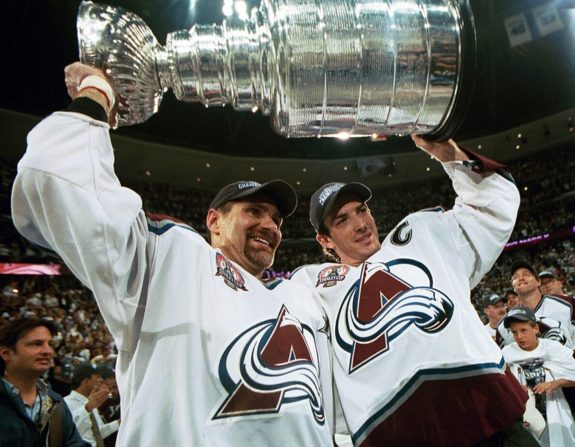
Although he gained admission into the Hall of Fame after his retirement, Dave Andreychuk was an unproductive addition for the Avalanche, as he scored a combined eight points in 31 regular-season and playoff appearances. He declined to re-sign with the franchise and left as a free agent.
Brian Rolston scored at least 50 points three times in his four full seasons with the Bruins, and positioned himself as a solid offensive contributor before joining the Minnesota Wild after the 2004-05 lockout. Center Samuel Pahlsson played less than half of a season with the Bruins before being traded to the Anaheim Ducks, where he established himself as one of the NHL’s top defensive pivots and helped the franchise win the first-ever Stanley Cup in 2007. Defenseman Martin Grenier only played 18 total NHL games, scoring a single goal in his brief big-league career. The first-round pick in 2000 was used to select defenseman Martin Samuelsson, who also enjoyed a short-lived NHL career, appearing in 14 NHL games over parts of two seasons with the Bruins.
This trade solidified the legacies of several prominent Avalanche stars and produced one of the NHL’s most memorable playoff moments – truly a victory on every count for Colorado’s management group.
February 21, 2001: Colorado acquires defenseman Rob Blake and center Steven Reinprecht from the Los Angeles Kings in exchange for forward Adam Deadmarsh, defenseman Aaron Miller, a first-round pick in 2001, a first-round pick in 2003, and a player to be named later (center Jared Aulin)
I slightly fudged the rules in order to include this trade as it occurred just outside the two-week filter, but this deal still reflects the spirit of deadline day given that the Avalanche were trying to win another championship.
Blake, the centrepiece of the deal, was a former Norris Trophy winner and was in the midst of an extremely productive season in which he had tallied 49 points in 54 games at the time of the trade. The future Hall-of-Fame blueliner ended up playing five seasons for the Avalanche and was a key cog in their 2001 and 2002 playoff runs, which resulted in an appearance in the 2002 Western Conference Final and a Stanley Cup win in 2001. He scored at a 53-point pace in the regular season over his Avalanche tenure, and added another 43 points in 68 playoff games for the franchise before returning to the Los Angeles Kings as a free agent.
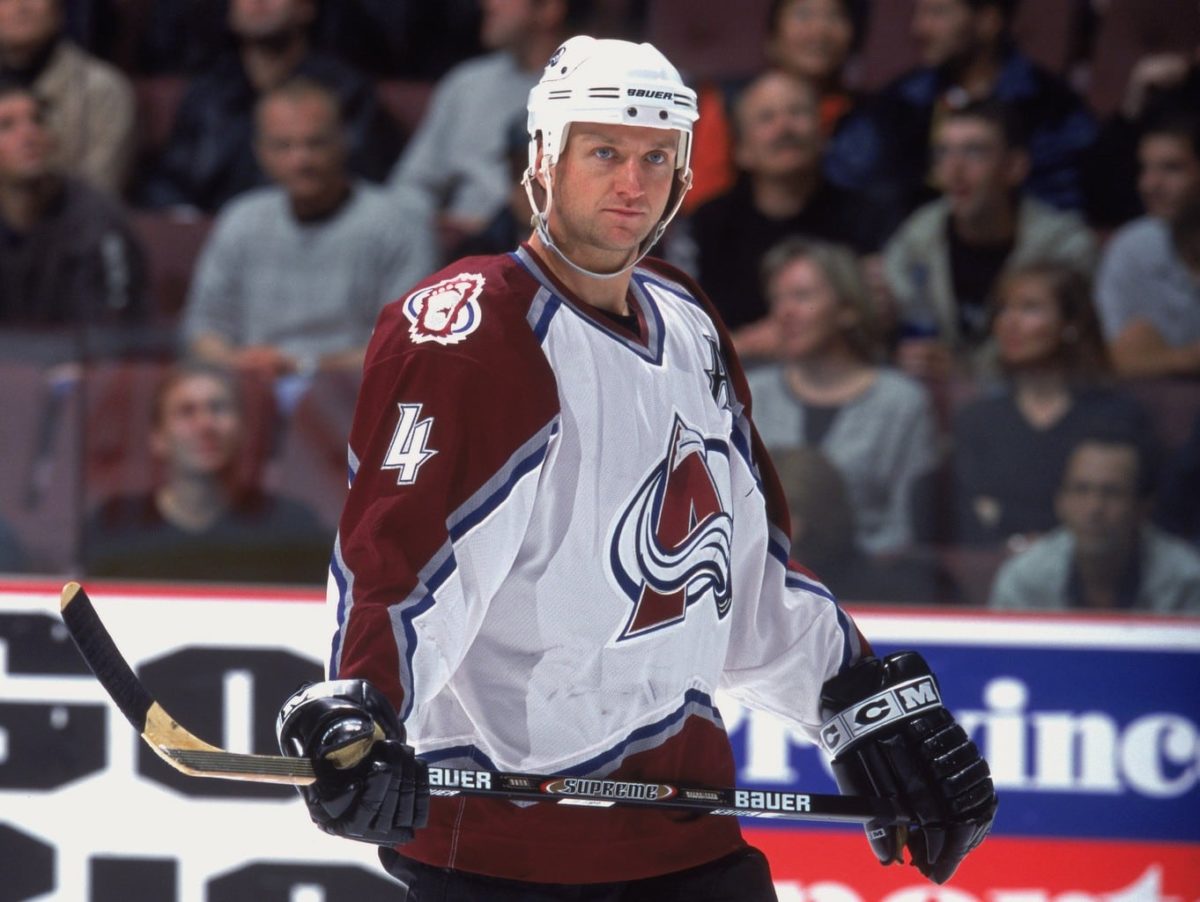
Although his addition was less newsworthy than adding another Hall-of-Fame defenseman to a blueline already boasting Bourque and Adam Foote, Steven Reinprecht forged his place on a stacked Avalance roster. He scored five points in 22 playoff games as the team went on to win the Stanley Cup in his first season, and then posted seasons of 46 (2001-02) and 51 (2002-03) points as an underrated piece within Colorado’s top-six forward group.
Giving up gritty winger Adam Deadmarsh stung, as he had been a dependable soldier in their 1996 Stanley Cup triumph (17 points in 22 playoff games) and was a consistent 20-goal, 50-point threat in the regular season. He scored 85 points in 114 games over parts of three seasons for the Kings before retiring due to concussion issues. Aaron Miller was a reliable, but unspectacular depth defenseman who played for the Kings until 2007-08, and Jared Aulin skated in 17 games for the Kings before traversing the minors and Europe for the rest of his playing career.
The two first-round picks were used by the Kings to select centers David Steckel (2001) and Brian Boyle (2003), two reliable, but unassuming pivots who haven’t been more than bottom-six fixtures for the majority of their careers. All in all, the Avalanche surrendered a number of assets, but none were as impactful as the several seasons they received from Blake and Reinprecht, not to mention the several consecutive seasons defined by deep playoff runs prior to the 2004-05 lockout. In terms of value and historical significance, this trade ranks among the best in NHL history, let alone just that of the Avalanche.
March 9, 2004: Colorado acquires center Chris Gratton, defenseman Ossi Vaananen, and a second-round pick in 2005 from the Phoenix Coyotes in exchange for defensemen Keith Ballard and Derek Morris
Like the first two trades mentioned, the Avalanche hoped to add veteran pieces to bolster one of their final Stanley Cup pushes before their core of stars fully aged out of their prime. Two promising young defensemen were sacrificed in the process, but Colorado mined a skilled center with the accompanying draft pick to form the basis of their next period of contention.
Despite reaching the second round of the 2004 Playoffs, Chris Gratton (three points in 24 regular season and playoff games) struggled offensively and left for the Florida Panthers in the following season. He posted two consecutive seasons of at least 30 points with the Panthers but retired two years later. Ossi Vaananen played two more seasons but departed for Sweden prior to the 2008-09 season before making a brief NHL comeback the year after.
You May Also Like:
- Avalanche Should Go All Out to Bring in Veteran Center
- 3 Takeaways From the Avalanche’s 4-2 Win Over the Kings
- NHL Morning Recap – March 3, 2026
- Avalanche’s Best Trade Deadline Assets
- Avalanche Week Ahead: Schedule & Storylines – Trade Deadline, Kulak, Dominance and More
Ballard, a highly touted collegiate prospect at the time, had already been traded before by the Buffalo Sabres and the Avalanche once again shipped him off before he even made his NHL debut. He scored 30 points in a season twice for the Panthers before acting as a depth piece for the Stanley Cup finalist Vancouver Canucks in 2010-11. The other defender in this deal, Derek Morris, had posted 48 points in 75 games the year before for the Avalanche and scored 28 in 69 games at the time of the trade. It’s clear that his best days were behind him as he never eclipsed 29 points in a season in the years after the trade.
The real gem of the trade was the second-round pick that the Avalanche used to select center Paul Stastny in the 2005 NHL Entry Draft. As the son of Quebec Nordiques legend Peter Statsny, the pressure was on for the young forward to carry on his family’s storied legacy. Over eight seasons with the organization, Statsny scored at a 70-point pace and also finished with 18 points in 22 playoff games. With 458 total points, he sits just outside the franchise’s top 10 in scoring, an understatedly dynamic piece of the Colorado teams of the early-2010s.
February 26, 2008: Colorado acquires defenseman Adam Foote from the Columbus Blue Jackets in exchange for a conditional first-round pick in 2008, and a conditional fourth-round pick in 2009
In trading two draft picks to the Columbus Blue Jackets for Foote, the Avalanche brought back a key piece from their run of Stanley Cup contention between the late-1990s and early-2000s.
Related: Colorado Avalanche All-Decade Team: Defensemen
Foote produced very little offensively and was limited by injury during his second stint with the team, but his physicality and veteran presence emboldened an Avalanche squad looking to return to the playoffs after missing out in 2006-07. They progressed to the second round in the 2008 Playoffs, but either missed the postseason or flamed out in the first round over the next two seasons. After captain Joe Sakic retired following the 2008-09 season, Foote took up the leadership mantle until he too stepped away from the game after the 2010-11 campaign.
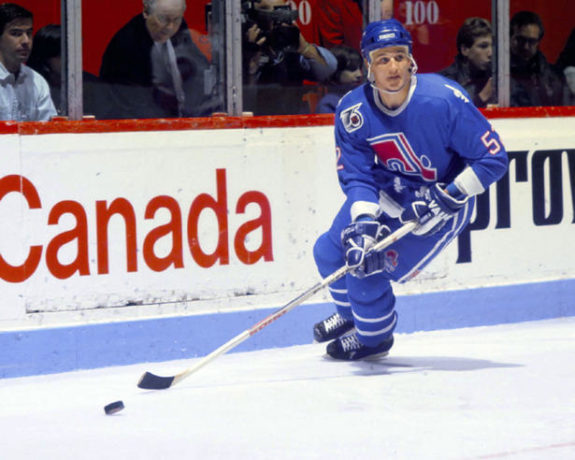
The first-round pick moved hands from the Blue Jackets to the Philadelphia Flyers, who used it to select defenseman Luca Sbisa. He played over 500 games in the NHL but never scored more than 24 points in a single season. His last NHL appearance was a one-game stint with the Nashville Predators in 2020-21.
Instead, the fourth-round pick proved more valuable as Columbus chose defenseman David Savard, who developed into a top-four defenseman and was later acquired by the Tampa Bay Lightning in their successful quest for the 2021 Stanley Cup. He left Columbus as the defenseman with the most games played (597) and fourth in scoring (166 points).
I grade this trade as a win for the Avalanche, but both franchises got fair value in the deal. Colorado added a veteran defenseman for several playoff pushes including a second-round appearance, and the Blue Jackets obtained a dependable blueliner who made up part of their defensive core for almost a decade.
February 27, 2012: Colorado acquires forwards Jamie McGinn, Mike Connolly, and Michael Sgarbossa from the San Jose Sharks in exchange for forwards T.J. Galiardi, Daniel Winnik, and a seventh-round pick in 2013
This trade was not an overwhelming victory for the Avalanche considering the talent level of the players involved, but they acquired a strong depth piece for assets that failed to contribute much at the NHL level following the trade.
Jamie McGinn scored at a 40-point pace over his four-year Avalanche tenure and produced a career-high of 38 points in 79 games in the 2013-14 season to go with five points in seven playoff games. Mike Connolly and Michael Sgarbossa combined to play 11 games for the Avalanche, and spent the rest of their careers flitting between the NHL and the minors.
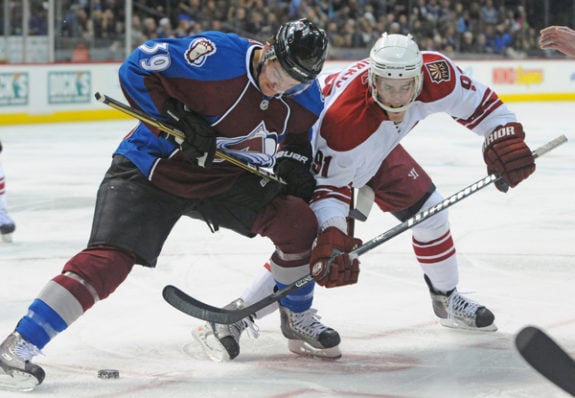
T.J. Galiardi had scored 39 points for the Avalanche in 2009-10, but never eclipsed 17 points in a single campaign after the trade. Daniel Winnik posted 25 points on three different occasions after leaving Colorado, but his impact never rose above a bottom-six level. The seventh-round pick was used to select Russian winger Emil Galimov, but he never made his way over from Europe.
In primarily swapping Winnik and McGinn, the Avalanche bolstered their scoring options. McGinn played in a slightly more elevated role with Colorado, and his success pushes this trade into a win for the franchise even if it’s not very significant in the long run.
The Avalanche’s 5 Worst Trade Deadline Deals of All Time
In 26 years of NHL competition, the Avalanche are no stranger to completing misguided trades of their own. I’ve compiled a list of five of the organization’s worst deadline deals since moving to Colorado. While some were less punishing than others given the price of acquisition, one or two may have cost the Avalanche a shot at the Stanley Cup. Let’s dig in.
April 10, 2021: Colorado acquires goaltender Devan Dubnyk from the San Jose Sharks in exchange for defenseman Greg Pateryn and a fifth-round pick in 2021
It’s a testament to Colorado’s management group over the years that there are rather slim pickings to name five truly woeful trade deadline moves. This trade, which saw Devan Dubnyk join up with the Avalanche as goaltending depth, is unfortunate not for what the team gave up, but the netminder’s poor performance.
Talented backup Pavel Francouz missed the entire 2020-21 season recovering from surgery, which meant that a hole needed to be filled behind Vezina Trophy-finalist Philipp Grubauer. Given that injuries and limited depth at the position cost the Avalanche a berth in the conference finals in the 2020 NHL Playoffs, bolstering the options in the crease was a priority for general manager Sakic.

Although Dubnyk’s career save percentage (SV%) of .914 suggests an extended run of competence, his numbers leading up to the 2021 deadline were less than ideal. After a span of five stellar years (2014-19) in which he never posted a SV% below .913, his performance declined from the 2019-20 season. In 30 games with the Minnesota Wild that season, he put up a .890 SV% and followed that up with an .898 SV% in 17 games with the San Jose Sharks in 2020-21. Upon joining the Avalanche, the veteran goaltender appeared in five regular-season games and ended his short stint with the club with an .886 SV% and a 3.26 goals-against average (GAA).
Given his brief stay and the middling assets going to the Sharks, this deal didn’t necessarily negatively impact Colorado’s season to a great degree. Dubnyk did not appear in any playoff games for the Avalanche that season, but he failed to deliver on the supposed depth his acquisition had promised. His sub-standard performance was predictable given his waning play in recent seasons, making this trade even less logical in retrospect.
February 18, 2011: Colorado acquires goaltender Brian Elliott from the Ottawa Senators in exchange for goaltender Craig Anderson
In terms of the value received from Brian Elliott’s single season as a member of the Avalanche and considering Craig Anderson‘s immediate revival, this trade has a claim to be named Colorado’s worst-ever deadline deal.
After struggling to carve out a role as an everyday NHL goalie with the Chicago Blackhawks, Anderson rattled off two admirable campaigns as a sturdy backup option for the Florida Panthers. His numbers over the 2007-08 and 2008-09 seasons (.928 SV% in 48 total games) suggested that he deserved a chance at a starting job. After becoming a free agent, the journeyman signed with the Avalanche ahead of the 2009-10 season.
Anderson’s debut season in Colorado saw him play a whopping 71 games and post a .917 SV%, leading the Avalanche back to the playoffs after a one-year hiatus. His inspired play during the series, which included a 51-save shutout, pushed the Western Conference’s top-seeded Sharks to six games, but the team could not overcome the talent discrepancy between the two rosters. After he lost the starting job the next season and the Avalanche fell out of playoff contention, he was traded to the Ottawa Senators for Elliott.

Elliott only played in 12 games for the Avalanche after the trade, posting a dismal .891 SV% and eventually left for the St. Louis Blues in free agency. His five-year tenure with the Blues saw him put up a SV% of at least .917 four times and become a solid tandem option as a result. Anderson grew into one of the NHL’s best goaltenders over his time with the Senators, becoming the franchise’s leader in both games played and wins and taking them to the Eastern Conference Finals in the 2017 Playoffs.
This trade stings the most as both goaltenders achieved notable individual success following the deal, but neither occurred in Colorado. The Avalanche let a bonafide starter slip from their grasp and received little in return, making this arguably the worst deadline deal in franchise history.
February 19, 2011: Colorado acquires defenseman Erik Johnson, center Jay McClement, and a conditional first-round pick in 2011 from the St. Louis Blues in exchange for defenseman Kevin Shattenkirk, forward Chris Stewart, and a conditional second-round pick in 2011
In a blockbuster deal involving several blue-chip prospects, the Avalanche and Blues swapped the faces of their respective youth movements.
At the time of the deal, Kevin Shattenkirk was 46 games into his rookie season with 26 points in 46 games to his name. His draft pedigree (a first-round pick in 2007) and a productive collegiate career suggested that he’d develop into a first-pair offensive dynamo in the NHL. Similarly, Christ Stewart was in his third full season with the Avalanche and had scored 30 points in 36 games before being dealt. That he was coming off of a sophomore season where he led the team with 64 points in 77 games, including him in the deal felt like selling low on a power forward on the precipice of stardom.
Shattenkirk did end up blossoming into one of the NHL’s top offensive defenseman, his 258 points in 426 games with the Blues ranking ninth league-wide at his position during that time. He also featured prominently on the 2015-16 St. Louis squad which reached the Western Conference Final for the first time since the 2000-01 season. Stewart scored at a 45-point pace over his time with the Blues, but never materialized into the All-Star level force his early career returns had indicated could become a real possibility.

The main piece coming back to Colorado was 2006 first-overall pick Erik Johnson, whose injury troubles had stalled his development as a formidable two-way force on the blue line. He’d scored at a 37-point pace over his time with the Blues, and was a domineering physical presence from the backend. Despite struggling to stay healthy, the Avalanche have obtained 12 years of service from the veteran defender and he’s cracked the franchise’s all-time top 10 leaderboards for games played and points scored by a defenseman. Center Jay McClement only played 104 regular-season games over two seasons for the Avalanche, and left for the Toronto Maple Leafs following the 2011-12 campaign.
The first-round pick that the Avalanche received turned into defenseman Duncan Siemens who never fulfilled the potential suggested by his draft stock. He only played in 20 total games for the franchise and was out of professional hockey after the 2018-19 season. The Blues selected forward Ty Rattie with the second-round pick, but he never established himself on an NHL roster. While he was a minor-league scoring threat (produced at an 82-game rate of 56 points), he only posted 30 points in 99 NHL games.
I do not consider this trade to be outright awful given Johnson’s longevity and veteran leadership on the current Stanley Cup favourites, but the deal looked lopsided at the time. That the pick used to select Siemens should have been an equalizing factor hurts when Shattenkirk fulfilled his offensive potential and the Avalanche trudged through some lean years in the aftermath. The organization does not have many trade deadline misses, but this trade squeaks through as a net-negative swap.
March 11, 2003: Colorado acquires forward Bates Battaglia from the Carolina Hurricanes in exchange for forward Radim Vrbata
It’s difficult to quibble with many of the moves from the franchise’s heyday but this trade, which sent a then 21-year-old Radim Vrbata to the Carolina Hurricanes in exchange for Bates Battaglia, was a head-scratcher.
Vrbata was in the midst of his sophomore season in which he had tallied 30 points in 66 games, matching his rookie output in 14 more games. In stints with five other NHL teams, the winger scored at least 20 goals in a season on six occasions, developing into a reliable offensive threat over the course of his 1000-game career.

The older and more physical Battaglia had experienced a significant downturn in production from the season prior (2001-02), in which he and the Hurricanes surprisingly advanced to the Stanley Cup Final. He scored 46 points in 82 regular-season games and tallied another 14 in 23 playoff appearances as he finished second on the team in postseason scoring. The 2002-03 season saw the bruising winger post 25 points in 83 games split between the Avalanche and Hurricanes, and a scant two points in seven playoff games as Colorado crashed out early.
Colorado banked on Battglia’s more rugged style to translate to the playoffs as the organization hoped to capitalize on the final years of an aging core, with Sakic, Blake, and Patrick Roy all on the wrong side of 30. Instead, his fleeting postseason success seemed like a mirage and he failed to make much of an impact as a member of the Avalanche. He played four games in 2003-04 and was promptly dealt to the Washington Capitals. All in all, the deal was a misjudgment of a player’s true production level and cost the franchise an up-and-coming talent.
April 3, 1996: Colorado acquires a fourth-round pick in 1996 from the Washington Capitals in exchange for the rights to center Anson Carter
Anson Carter was drafted by the then Quebec Nordiques in the 10th round of the 1992 NHL Entry Draft but his rights were traded to the Washington Capitals before ever suiting up for the franchise. Given the state of the Avalanche’s forward group at the conclusion of Carter’s collegiate career, his path to the NHL was obstructed by a deep assortment of offensive talent. As such, his wish to be traded was granted, and Colorado received a mid-round pick as compensation.
Related: Black History Player Profile – Anson Carter
The native of Toronto, Ontario went on to play 674 games in the NHL while scoring 421 points in the process. He tallied at least 20 goals in a season five times over his career, punctuated by a 33-goal campaign in the 2005-06 season. With the pick acquired for Carter, Colorado drafted defenceman Ben Storey but he never played in the NHL and instead bounced around Europe and the minor leagues for the duration of his professional career. In terms of the value recouped, this trade is a lopsided affair in favour of the Capitals. After only playing 19 games for Washington, the team packaged Carter as part of a bigger deal to acquire Hall-of-Fame center Adam Oates from the Bruins.
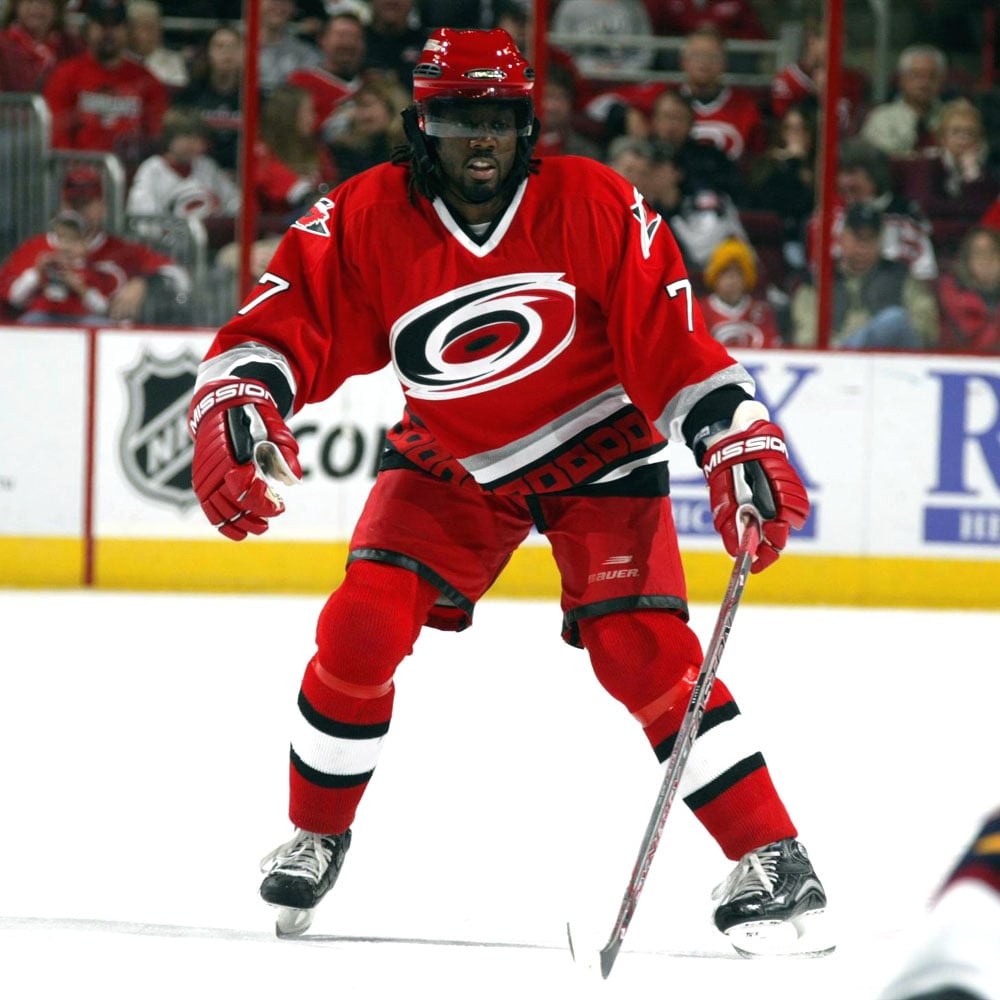
The trade didn’t diminish the Avalanche’s on-ice success as they went on to reach several conference finals and won the Stanley Cup in 2001. Whether Carter develops in the same fashion is debatable given the lack of opportunity in Colorado at the time, but parting ways with a steady goal-scorer for virtually no return stings nonetheless.
Recapping the Avalanche’s 5 Most Recent Trade Deadlines
As a refresher, here is a brief rundown of Colorado’s trade activity from the five most recent NHL trade deadlines. As with the lists for the best and worst trade deadline deals in Avalanche history, any trades completed within two weeks of that season’s deadline date are included.
2022 NHL Trade Deadline
- Colorado acquires Artturi Lehkonen from the Montreal Canadiens in exchange for Justin Barron and a 2024 second-round pick.
- Colorado acquires Andrew Cogliano from the San Jose Sharks in exchange for a 2024 fifth-round pick.
- Colorado acquires Nico Sturm from the Minnesota Wild in exchange for Tyson Jost.
- Colorado acquires defenseman Josh Manson from the Anaheim Ducks in exchange for Drew Helleson and a 2023 second-round pick.
2021 NHL Trade Deadline
- Colorado acquires center Carl Soderberg from the Chicago Blackhawks in exchange for forwards Josh Dickinson and Ryder Rolston
- Colorado acquires goaltender Devan Dubnyk from the San Jose Sharks in exchange for defenseman Greg Pateryn and a fifth-round pick in 2021
- Colorado acquires defenseman Patrick Nemeth from the Detroit Red Wings in exchange for a fourth-round pick in 2022
2020 NHL Trade Deadline
- Colorado acquires forward Vladislav Namestnikov from the Ottawa Senators in exchange for a fourth-round pick in 2021
- Colorado acquires goaltender Michael Hutchinson from the Toronto Maple Leafs in exchange for defenseman Calle Rosen
2019 NHL Trade Deadline
- Colorado acquires center Derick Brassard and a conditional sixth-round pick in 2020 from the Florida Panthers in exchange for a third-round pick in 2020
2018 NHL Trade Deadline
- Colorado acquires defenseman Ryan Graves from the New York Rangers in exchange for defenseman Chris Bigras
Avalanche 2022 NHL Trade Deadline Targets
With the 2022 NHL Trade Deadline rapidly approaching, the Avalanche must make a big splash in order to capitalize on their wide-open Stanley Cup window. The top targets for the Avalanche appear to be significant offensive pieces in Sharks center Tomas Hertl or Flyers captain Claude Giroux, but no player should be ruled out ahead of time. One thing is for certain, Sakic and company cannot let this opportunity slip and his deadline activity could define his tenure as Avalanche general manager. Which moves do you see the team making ahead of the March 21 deadline?
